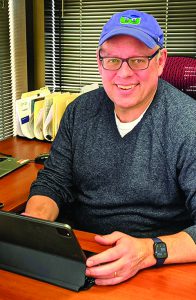
Under the leadership of newly-appointed president Jim Siplon, the EDC Warren County continues to focus on attracting new business to the area.
Siplon, a former EDC board member, has firsthand experience with the process.
“The EDC was instrumental in helping me when I was trying to get JUST Water off the ground, particularly Ed Bartholomew, who was the longtime president,” he said. At the time, Siplon was chief operating officer of the water startup and was responsible for choosing the company’s headquarters.
“I’m not a spectator in this. I’m a player. I came here in 2014 to figure out if this was a good place to base JUST. I looked at a number of places across the country, and I had never seen the receptivity and kind of collaborative nature that I found here. Now I’m trying to tap into it in my new role of working on economic development for the entire region.”
Siplon took the helm of the EDC during the midst of the COVID-19 pandemic. A top priority was to offer support to the tourism industry, which accounts for 25 to 40 percent of the local economy.
“When COVID struck, we ran the risk of literally having the bottom dropping out of an enormous part of our economy,” he said. “Here in Warren County we immediately organized a group of private sector participants in the tourism and hospitality world to meet together with public sector players like the EDC and the county and municipalities to figure out what is that we can do that is both safe and can also potentially backstop this huge economic impact.”
It was in part because of the collaborative effort that Lake George had the largest July and August in its entire history, he said. Gore Mountain and West Mountain are also experiencing strong seasons despite reduced capacities.
“To me, that’s an example of what I’m talking about,” said Siplon. “It required people to work together in ways they haven’t always. A community that comes together and works across these boundaries for a common good, that’s an asset all by itself. It’s a tensile strength that is an intangible that is oftentimes hard to gauge.”
The EDC is focused on promoting the region as one of the most desirable in the entire country.
“This place has unique advantages that I think often times, when you’ve lived here all your life, you don’t know are universal,” said Siplon who has lived in five countries and 23 states. “It starts with our unbelievable access to essentially undeveloped land and extends into the availability and plentifulness of natural resources–timber, clean power, plentiful and clean air and water. We aren’t flooding. We don’t live in tornado alley. We don’t have forest fires. These are all things that are increasingly dominating life in other parts of this country and the world.”
Siplon also promotes the region’s low traffic volumes, reasonable cost of living, quality of schools, access to health care, community safety, proximity to major cities and abundance of recreational activities.
“There’s a remarkable set of cultural and quality of life assets here,” he said. “And if you look at what happening with housing in the region, we clearly are no longer an undiscovered treasure.”
EDC recently commissioned a survey in collaboration with Lake Placid’s Regional Office of Sustainable Tourism. It was designed to determine what factors would lead individuals to consider relocating to the Adirondacks as year-round residents.
Approximately 10 percent of respondents indicated that they are finalizing plans to move to the region. A significant percentage of respondents also expressed an interest in moving to the area if their jobs remained permanently remote.
The EDC is not short sighted when it comes to managing future growth and is focused on long-term sustainability. It is committed to maintaining affordable housing and avoiding gentrification issues that have plagued many cities.
“I don’t just think of sustainability from an ecological or environmental standpoint. Sustainability to me means to endure—to be able to sustain,” he said. “Our economy here has great potential to be balanced and sustainable over the long haul. It is not unmanaged development that we are after. It’s balance, sustainable development—things that are aligned with the land and resources and the culture. It’s not a race. To me, I think of it as more of a hike.”
